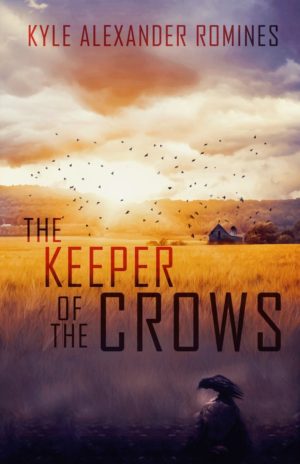Editor’s note: The following interview was conducted by in-Training medical student editor Evan Torline.
 Sometimes it takes the challenges of life to teach us what’s most important to us, and Kyle Romines knows this all too well. Kyle Romines is a fourth-year medical student at the University of Louisville hailing from Campbellsville, KY. He loves board games, story-telling, thunderstorms, and of course, a good read. His first novel, titled The Keeper of the Crows, appeared on the Preliminary Ballot of the 2015 Bram Stoker Awards in the category of Superior Achievement in a First Novel and will soon publish his second full length novel, a western, titled Salvation. He hopes that through his experiences others can realize it’s worth fighting to do what you love, whatever that may be.
Sometimes it takes the challenges of life to teach us what’s most important to us, and Kyle Romines knows this all too well. Kyle Romines is a fourth-year medical student at the University of Louisville hailing from Campbellsville, KY. He loves board games, story-telling, thunderstorms, and of course, a good read. His first novel, titled The Keeper of the Crows, appeared on the Preliminary Ballot of the 2015 Bram Stoker Awards in the category of Superior Achievement in a First Novel and will soon publish his second full length novel, a western, titled Salvation. He hopes that through his experiences others can realize it’s worth fighting to do what you love, whatever that may be.
Evan Torline: What got you interested in writing?
Kyle Romines: I was pretty shy and lonely as a kid. Reading was my escape. I could travel to distant lands, go on adventures, and meet interesting people, all within the pages of a book. As I got older, writing became a channel of communication — a way for me to express myself in a way I couldn’t out loud.
ET: How long have you been writing and what kinds of writing do you do?
KR: I wrote my first book-length manuscript the year I started college — it was pretty awful! When I finished The Keeper of the Crows in 2010, it was my fourth completed manuscript. It took me five years of revision and query letters to find a publisher, but it was well worth the wait! I write in all kinds of genres! My primary interests are science fiction, fantasy, horror and western. My first published book, The Keeper of the Crows, is a supernatural thriller. The Chrononaut (my latest release) is firmly science fiction. I’ve signed a contract with my publisher for my second full-length novel, a western.
I’ve heard publishers and agents usually prefer writers to stick with one genre, but I go where the story takes me.
ET: It’s easy to tell when talking to you how much you love your writing, but as I understand it, it hasn’t always been the first priority in your life. Did medical school change that? If so, how?
KR: Writing was a hobby for me, something I enjoyed doing. I started writing books in college, but I never thought I had the talent to make it in such a competitive market. I had submitted to agents and publishers before medical school and received some rejections. So I thought of writing as a hobby going into medical school. But when I started school, I realized how much I missed time to write, and how much I enjoyed telling stories. And I realized I couldn’t stop myself from writing — I needed to write. I received an offer of publication during my second year of medical school, which was when I realized that I could actually make it in the publishing world.
ET: What influenced your choice to go to medical school?
KR: I fell into medicine like gravity. My father is a general surgeon, my mother a registered nurse. I did well in high school and college and majored in the sciences. Medicine felt like the natural progression. I never seriously considered or explored alternate possibilities.
I thought of writing as a hobby. With all the competition and economic uncertainty that comes with being a creative, it seemed reckless to pursue a career in writing at that time.
ET: Would you consider yourself a medical student or writer? What would you say to fellow medical students who feel like they’ve given up important parts of their lives to pursue medicine?
KR: I suppose the easy answer would be to say ‘both,’ but that would be a cop-out. I am a writer. It’s in my blood now. There’s no way to describe what it feels like to know with absolute certainty what it is you love doing most in the world — and then to make that your career. Writing isn’t a job for me. It’s a passion that burns white-hot.
The truth is, I’ve never felt entirely comfortable in the skin of a medical student. I’ve always felt more like someone staring in from the other side of the glass.
But there have also been moments of great beauty. Medicine is an art every bit as much as writing — one of the most truly noble professions that exist. That’s why so many endeavor to make the strenuous sacrifices demanded by medical education. If medicine is what you know in your heart you’re meant to do — if you can’t see yourself doing anything else — then you must see it through.
And that is how I feel about writing.
If you’re reading this and you’re in medical school — hold onto your passions with everything you’ve got. Hold onto your relationships. Hold onto whatever it is that makes you unique and don’t let go. Make time for the things you love. You’ll be happier in the long run.
ET: How do you find time to write?
KR: Medical school is a jealous mistress. It demands sacrifice.
How much of yourself are you willing to give up to become a doctor? Friendships? Relationships? Hobbies? It’s a question everyone has to answer for themselves.
Because if there’s one thing I’ve learned, medical school is never really over. After graduation comes residency. There’s always another test waiting, another board exam to prepare for.
But writing is equally jealous. Inspiration strikes without warning. Then comes the compulsion to write. It becomes a need. When I write, I’ll lose myself in the story — sometime with entire days vanishing in the process.
It should go without saying that sometimes these two parts of my life compete with each other. My publisher contacted me to begin the editing process on The Keeper of the Crows at the exact time I was supposed to be studying for Step 1 of the boards.
So how have I done both? By sacrificing almost everything else in my life. It’s lonely in the short-term, but I’m making the investment knowing it will be worth it in the long-term.
ET: Your most recently published work, The Chrononaut, is reminiscent of a technology-heavy, futuristic-laden Michael Crichton novel. Where do you get the ideas for your stories?
KR: My ideas come in all sorts of ways: from listening to music, looking at art, dreams, real-life experiences and all sorts of places. They hit me at completely random times in a flash of inspiration, and I immediately have to write them down. I get ideas for new books faster than I can finish existing projects. I’m working on a medical thriller called Synapse based off my neurology rotation that’s in the vein of a Robin Cook or Michael Palmer novel. I’ve also been able to draw on what I’ve learned in medical school for several science fiction projects I have in the works.
ET: What are your future plans for your writing? Do you plan to write full-time after medical school, and if so, how did you come to that conclusion? Any second thoughts?
KR: This much I know: I can’t stop writing any more than I could stop breathing. Writing is what I love doing most in the world. If and when I reach a point where writing full-time becomes financially sustainable, I’ll do it.
Medical school is a choice I have to make every day, with that knowledge in the back of my mind. Sometimes I wonder if I’m doing the right thing, especially when that alarm rings early in the morning. And then there are days of joy, when choosing one over the other is bittersweet. But I’ve come this far, and at least for now, I plan to see it through to the end.
You can learn more about Kyle and his writing at kylealexanderromines.com.


